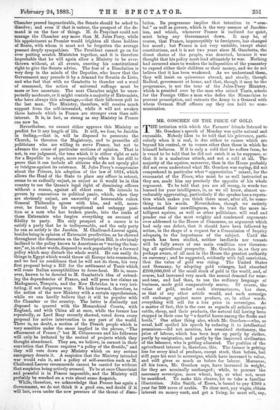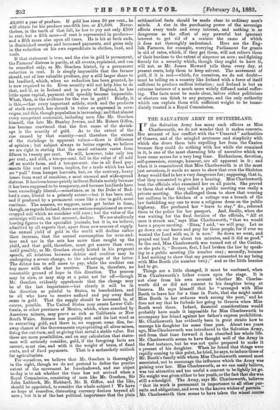MR. GOSCHEN ON THE PRICE OF GOLD. T HE irritation with
which the Farmers' friends listened to Mr. Gosehen's speech of Monday was quite natural and excusable. Nobody likes to be told that his grievance, parti- cularly when it is real, is due either to causes which are beyond his control, or to causes other than those in which he himself believes. If it is only a cold that he suffers from, he is vexed to be told that he did not catch it as he supposes, or that it is a malarious attack, and not a cold at all. The majority of the squires, moreover, then in the House probably did not even understand what Mr. Goschen was saying, did not comprehend in particular what " appreciation " meant, for the summarist of the Times, who mast be as well instructed as they are, made him say precisely the opposite of his whole argument. To be told that you are all wrong, in words too learned for your intelligence, is, as we all know, almost un- endurably aggravating, particularly if the speaker has a reputa- tion which makes you think there must, after all, be some- thing in his words. Nevertheless, though we entirely understand their unwillingness, we do trust the more in- telligent squires, as well as other politicians, will read and ponder one of the most weighty and condensed arguments ever addressed to the House of Commons, an argument which had only one defect, that it should have been followed by action, in the shape of a request for a Commission of Inquiry adequate, to the importance of the subject. Until the speech has been studied, neither landlords nor tenants will be fully aware of one main condition now threaten- ing all agricultural prosperity. Mr. Goschen is, as they are perhaps aware, of all men in the House the greatest authority on currency ; and he suggested, evidently with full conviction, that the value of gold was rising. The United States and Germany, by adopting gold coinages, had absorbed £200,000,000 of the small stock of gold in the world, and, of course, had increased very much the annual demand for wear- and-tear, and had thus, to use the ordinary language of business, made gold comparatively scarce. Of course, the value of gold, under such circumstances, has risen, as that of any other article would, and each sovereign will exchange against more produce, or, in other words, everything will sell for a less price in sovereigns. As a matter of fact, this is the case as regards all articles except cattle, sheep, and their products, the natural fall having been stopped in their case by " a fearful havoc among the flocks and herds." One other thing also, which Mr. Goschen—who, as usual, half spoiled his speech by reducing it to intellectual pemmican—did not mention, has remained stationary, the price of labour, which has been kept up partly by strikes, partly by emigration, and partly by the improved civilisation of the labourer, who is getting educated. The position of the agricultural interest is, therefore, this. The farmer is getting less for every kind of produce, except stock, than before, but still pays his rent in sovereigns, which have increased in value, and still gives as much as before for labour. Moreover, all his taxes, Mr. Goschen says, have increased in weight, for they are nominally unchanged ; while, to procure the necessary sovereigns, more wheat, hay, or what not, must be sacrificed. To make this clearer, let us take a familiar illustration. John Smith, of Essex, is bound to pay £300 a year for ZOO acres of arable. To clear rent, pay wages, obtain interest on money sunk, and get a living, he must sell, say,
..22,000 a year of produce. If gold has risen 20 per cent., he
will obtain for his produce one-fifth less, or £1,600. Never- theless, in the teeth of that fall, he has to pay not only £300
in rent, but a fifth more—if rent is represented in produce— and a fifth more also upon all taxes. He is hit at both ends, in diminished receipts and increased payments, and gains only in the reduction on his own expenditure in clothes, food, and tools.
If that statement is true, and the rise in gold is permanent, the Farmers' distress is partly, at all events, explained, and can be remedied only, as Mr. Goschen hinted, by a permanent reduction in rent. It is simply impossible that the farmer should, out of less valuable produce, pay a still larger share to his landlord, which, when no reduction has been granted, he is now required to do. Even security will not help him to do that, and if, as in Ireland and in parts of England, he has little spare capital, payment will speedily become impossible.
What, then, is the evidence for the rise in gold ? Briefly, it is this,—that every important article, stock and the products of stock excepted, has shrunk in value as expressed in sove- reigns, and this, though population is increasing; and that almost every competent economist, including men like Mr. Goschen himself, the late Mr. Stanley Jevons, and Mr. Robert Giffen, has become convinced that the first cause of the shrink- age is the scarcity of gold. As to the extent of the rise caused by that scarcity—and therefore the extent of the shrinkage in apparent values—there is difference of opinion : but subject always to better experts, we believe we are right in stating that the usual estimate varies from fifteen to twenty per cent. We will, however, take only ten per cent., and still, a ten-per-cent. fall in the value of all sold off an arable farm, and a ten-per-cent. rise in all fixed pay- xaents like rent and taxes, implies, for a trade which has had no " pull" from bumper harvests, but, on the contrary, heavy losses from want of sunshine, a most unusual and wide-spread distress. It has been borne quietly in Great Britain mainly because it has been supposed to be temporary, and because landlords have been exceedingly liberal,—sometimes, as in the Duke of Bed- ford's case, liberal to a princely extent—but it has been real, and if produced by a permanent cause like a rise in gold, must continue. The seasons, we suppose, must get better in time, though, as regards Ireland, there are serious suspicions of an over- cropped soil which no sunshine will cure ; but the value of the sovereign will not, on that account, decline. We are studiously Leaving figures to the specialist journals, but it is, we believe, admitted by all experts that, apart from new sources of supply, the annual yield of gold in the world will decline rather than increase, that the annual consumption for wear-and- tear and use in the arts has more than caught up the yield, and that gold, therefore, must get scarcer than ever, until possibly, as Mr. Goschen clearly hinted in his pregnant speech, all relations between debtor and creditor may be undergoing a severe change, to the advantage of the latter. The debtor has to sell more to pay, while the creditor can buy more with what he receives. There is, therefore, no reasonable ground of hope in this direction. The process may be slow, or may stop at a point not far off—though Mr. Goschen evidently apprehends that the change may be of the last importance—but clearly it will be in the direction so painful to States, to leaseholders, and to all who have to receive unfixed and pay away fixed sums in gold. That the supply should be increased is, of course, possible. The United States may annex Lower Cali- fornia, or other provinces of Mexico, which, when searched by American miners, may prove as rich as California or New South Wales. Science has possibly not said its last word as to extracting gold, and there is, we suppose, some dim, far- away chance of the Governments expropriating all silver mines, fixing the out-turn, and so giving that metal a stable value. But these are mere possibilities, and on any calculation that states- men will seriously consider, gold, if the foregoing facts are correct, must rise, and with it the weight of taxes, of fixed rents, and of fixed payments. That is a melancholy outlook for agriculturists. For ourselves, we believe that Mr. Goschen is thoroughly in the right, though we do not pretend to define the precise extent of the movement he foreshadowed, and our object to-day is to ask whether the time has not arrived when a Royal Commission, consisting of men like Mr. Goschen, Sir John Lubbock, Mr. Hubbard, Mr. R. Giffen, and the like, should be appointed, to consider the whole subject I We have no hope of remedies, distrusting currency doctors beyond all men ; but it is of the last political importance that the plain arithmetical facts should be made clear to ordinary men's minds. A rise in the purchasing power of the sovereign affects every trade and every interest, and nothing is so dangerous as the effort of any powerful but ignorant interest to get rid of a malaise the cause of which
it does not thoroughly understand. Here are the Eng- lish Farmers, for example, worrying Parliament for grants in aid of rates, which, if they get them, will not relieve them of their burdens to the extent of sixpence an acre; and fighting fiercely for a security which, though they ought to have it, will not, as Mr. James Howard tells them every day, at present rents, help them to keep solvent. The movement of gold, if it is real—which, for ourselves, we do not doubt— must be telling on a country like Ireland with a force of itself suffi3ient to produce endless irritation ; and Ireland is but an extreme instance of a much more widely diffused social suffer- ing. The facts must be made clear, before either politicians or electors can think to any purpose, and the only authority which can explain them with sufficient weight to be imme- diately trusted is a Royal Commission.



































 Previous page
Previous page